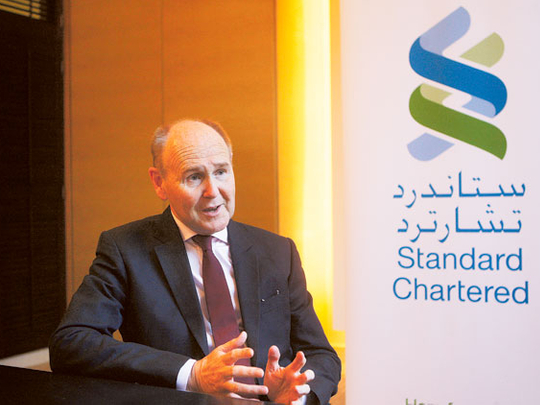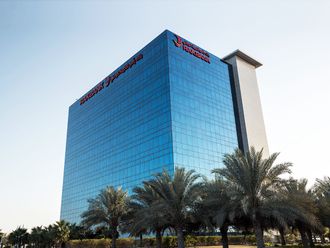
Dubai: Sir John Peace, chairman of Standard Chartered PLC, was in Dubai last week to attend the bank’s global board meeting. Ahead of the board meeting, Sir John met with His Highness Shaikh Mohammad Bin Rashid Al Maktoum, Vice-President and Prime Minister of the UAE and Ruler of Dubai. In this high level meeting, he apprised Shaikh Mohammad of the bank’s plans for the region. In an exclusive interview with Gulf News, Sir John spoke about the bank’s global and regional strategic direction, investment plans in the UAE and the challenges and opportunities in the post-crisis global economy.
Gulf News: You met Shaikh Mohammad during this visit. What were some of the topics discussed and what was the key message you delivered to him and to the UAE leadership?
Sir John Peace: It was a great opportunity for me to have met Shaikh Mohammad and let the government know that this is a very important market for Standard Chartered, a market that we have been in for a very long time. It was a very important meeting for us to make him aware of our commitment to the UAE and we continue to invest here. Indeed, I came here for the board meeting and to visit our new regional headquarter building. We expect it to be ready early next year. He made me feel very welcome and was very supportive of what we are trying to do as a bank. I explained to him that as a bank, we are almost unique in terms of the importance we give to some of the emerging markets across Asia, Africa and the Middle East and the network we have is very important for the UAE as it expands its business relationships with some of these markets.
What is the significance of the new regional headquarters and its importance and meaning for the bank regionally and globally?
I will break it (the answer) into two parts. The UAE itself is a very important market for us, but it is also a regional centre. If you look at the strategic importance of Dubai and the UAE, I was explaining to His Highness that the opportunity is for the country. The hub we are developing here is not just important for Standard Chartered; it is a big opportunity for the UAE. When you consider the fact that Africa is going to grow, it is going to be an important market. Europe is continuing to be in turmoil. As you can see, the trading that is being developed across the world with the UAE as a hub, Standard Chartered is in a great position to support that activity and of course, our operations in Dubai are a key part of that. For example, our trading room in Dubai nearly 200 people. It is pretty significant.
Does this mean Dubai is emerging as one of your key global hubs like Singapore or Hong Kong?
Singapore is a very important hub for us in Asia. I think we could see Dubai in the same league as a hub which provides a spring board into some very important markets. During our meetings in Dubai this week, one of the things we focused is Islamic banking which is an important part of our business. I wanted our board to understand what the new opportunities are.
Moving on to a broader subject, going by the recent developments in the world of banking, is the global financial services industry headed into an era of over regulation and lack of innovation?
Following the banking crisis or the financial crisis which started in 2007-08, everyone’s concern is how to prevent what happened, if they can, from recurring in the future. So, strengthening regulation and making it more effective is an important part of governments’ efforts. And the financial services industry has indeed been going through these changes in the last three to five years now. However, there needs to be some balance between regulatory efforts and the way we fund businesses. For example, we almost hold twice as much capital today compared to what we did in 2006-07. That makes us safer; we have stronger balance sheets. But at the same time, it is important that the banks and financial institutions can continue to lend particularly to smaller business. So, there has to be a balance to be achieved between safer and effective regulation and the necessity for lending to not just big corporates but also to small and medium enterprises (SMEs).
Are the regulators becoming over-enthusiastic about making banks safer while locking up funds to meet higher capital requirements?
I don’t like to say that the regulators are becoming over-enthusiastic. Regulators have a job to do. And clearly, what they are trying to do is to make the banking system safer. What we had in 2007 was a systemic failure where it was not just banks that were responsible, it was the whole system. Of course, the governments have a big role to play here. They are the ones who encourage us to lend to companies and individuals. So, I think each one is doing an important job. But the danger, of course, is that unless you find a way of having some overall macro prudential regulation to keep it all in balance, we are in danger of systemic risks.
Standard Chartered has been relatively unscathed by the global economic crisis, largely because of its emerging market focus, particularly its association with some of the world’s high growth markets such as Asia, Middle East and Africa. How is the slowing growth in China and the risk of high inflation and volatile currencies in some of the emerging markets like India going to impact the bank’s outlook?
Clearly, the global economy has slowed down. But we don’t subscribe to a possible hard landing in China. We can see that the Chinese economy has slowed and that has affected the overall growth of the global economy. That shows how important China is for the global economy. But nonetheless, China itself is growing significantly more than 7 per cent. There are few countries in the West that wouldn’t give their right arm for that kind of growth. So, we need to keep a kind of perspective on the speed of growth there (China). And, of course, what China has been doing is that it has not just been relying on its relationships with the West. It has been opening up new markets. Standard Chartered has been very successful in helping Chinese business going to Africa and other part of Asia. India is facing some problems. Some would argue that there are political problems there are as much as economic problems. But what has happened is that the Indian economy has slowed. There have been issues about issuing of licences in sectors such as telecom, mining and so on. But when you look at the overall fundamentals of India, you got to be optimistic.
Although Standard Chartered does not have significant exposure to Eurozone assets, do you have any big worries about the future of Europe and the banks operating there?
One of Standard Chartered’s fastest growing businesses is in Europe. We are not a retail bank in Europe but we are able to successfully support companies in Europe that want to trade with different part of our geographic focus. But if you are asking about the economy of Europe, I am going to give you a different answer than what I would have given 12 months ago. Today, I do subscribe to the view that the European Union has been successful in making Europe very peaceful, much more unified historically than it used to be. But Europe’s problem is the euro. When the euro was introduced, there was no exit strategy built into it. Thus, countries like Greece have a real problem. If you contrast the Greek economy with the rest of Europe, say Germany, the value of euro for Greece is excessively high. So, you could put up a very good case that Greece would actually be much better off outside the EU, so that it can depreciate its currency and fix its problems and stay within the EU but not within the euro. On the other hand, and I am very sympathetic to the argument of the contagion impact, keeping Greece within the euro is a price that must be worth paying. The question though, is, are the Greek people prepared to pay their share of that price? Forget what the rest of Europe thinks, consider what the Greeks think.
There have been reports on and off of UK banks moving out of the country because of taxation and regulatory changes. Very often, we hear speculation on Standard Chartered as well. What are your views on such talks?
We employ about 89,000 people around the world. Less than 2,000 people are actually based in the UK. If you ask where we should have our domicile, it isn’t just a question of where you want to be domiciled, and it is also question of where you want to be listed, which capital market you want to access and where you want to be regulated. There are a number of different factors which you have to look at together. Now, there are many advantages of being domiciled in the UK. I and Peter (Sands, CEO of Standard Chartered) are very clear at the moment that we have no plans to relocate the domicile from the UK. But, I will go on to say that this is something we have to review from time to time because if the levels of taxation and the intensity of regulation were to become much more expensive, then clearly our shareholders would expect us to think again.












